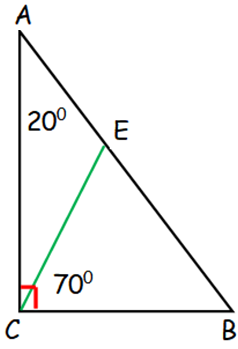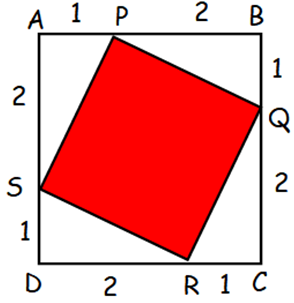SHSAT MATH SAMPLE TEST QUESTIONS AND ANSWERS
Question 11 :
If N = √(36 + 49), then N is
Solution :
N = √(36 + 49)
N = √85
The square root of 81 is 9.
But root 85 is greater than 81, the number between 9 and 10.
Question 12 :
Susan is 5 years older than Phen is now. In N years, Susan will be twice as old as Phen is now. If Susan is now 22 years old, what is the value of N?
Solution :
Let "x" be Phen's age
x + 5 be Susan's age
x + 5 + N = 2x ---(1)
Now Susan's age = 22 years
x + 5 = 22
x = 22 - 5 = 17
By applying the value of x in (1)
17 + 5 + N = 2(17)
22 + N = 34
N = 34 - 22
N = 12
Question 13 :
The number of integer values of n for which 1 ≤ √n ≤ 3 is
Solution :
1 ≤ √n ≤ 3
√1 = 1
√2 = 1.41....
√3 = 1.73
√4 = 2
√5 = 2....
√9 = 3
Hence 9 is number of integer values of n.
Question 14 :
In right triangle ABC, angle ACB is 90°. The number of degrees in angle BEC is

Solution :
In triangle ACB :
<ACB + <CBA + <BAC = 180
90 + <CBA + 20 = 180
<CBA = 180 - 110 = 70
Now consider the triangle CEB,
<CEB + <CBE + <BCE = 180
<CEB + 70 + 70 = 180
<CEB = 180 - 140
<CEB = 40
Question 15 :
If it is now 12:00 noon, what time was it 40 hours ago?
Solution :
40 + 12 = 52
By dividing 52 by 12, we get the quotient 4 and remainder as 4.
Now, we have to move the clock 4 hours back word from 12 : 00 noon. So we get 8 : 00 AM.
Question 16 :
The mean of all the odd integers between 6 and 24 is
Solution :
First let us list out the odd integers between 6 and 24.
7, 9, 11, 13, 15, 17, 19, 21, 23
So, there are 9 odd numbers lies between 6 and 24.
Mean = (7 + 9 + 11 + 13 + 15 + 17 + 21 + 23)/9
= 135/9
= 15
Question 17 :
Let x be an element of the set {0.2, 1.2, 2.2, 3.2, 4.2}. For how many values of x is 10x/3 an integer?
Solution :
Let f(x) = 10x/3
|
x = 0.2 = 10(0.2)/3 = 2/3 Not integer |
x = 1.2 = 10(1.2)/3 = 12/3 = 4 = integer |
x = 2.2 = 10(2.2)/3 = 22/3 = Not integer |
|
x = 3.2 = 10(3.2)/3 = 32/3 = Not integer |
x = 4.2 = 10(4.2)/3 = 42/3 = integer |
Hence for 2 values of x, we get integer.
Question 18 :
George has just enough money to buy 3 chocolate bars and 2 ice cream cones. For the same amount money, he could buy exactly 9 chocolate bars. For the same amount of money, how many ice cream cones could George buy?
Solution :
Let "x" and "y" be the cost of one chocolate bar and one ice cream cone.
3x + 2y = f(x) ---(1)
Cost of 9 chocolate bars = 9x = f(x) ----(2)
(1) = (2)
3x + 2y = 9x
2y = 9x - 3x
2y = 6x
y = 3x ==> x = y/3
By applying y = 3x in (1), we get
3(y/3) + 2y = f(x)
y + 2y = f(x)
f(x) = 3y
Hence, we can buy 3 ice cream cone for the same amount.
Question 19 :

ABCD and PQRS are squares, as shown. The area of PQRS is
Solution :
To find the side length pf RS, we have to use Pythagorean theorem.
In triangle DSR,
SR2 = SD2 + DR2
SR2 = 12 + 22 = 5
SR = √5
Area of the square PQRS = a2
= (√5)2 = 5
Question 20 :
If x = 10 and y = 8, what is the value of y (3x – 2y)?
Solution :
= y(3x – 2y)
x = 10, y = 8
= 8(3(10) – 2(8))
= 8 (30 - 16)
= 8 (14)
= 112
More Practice Test Papers
SHSAT math practice test - Paper 1
SHSAT math practice test - Paper 2
SHSAT math practice test - Paper 3
SHSAT math practice test - Paper 4
SHSAT math practice test - Paper 5
SHSAT math practice test - Paper 6
SHSAT math practice test - Paper 7
SHSAT math practice test - Paper 8
SHSAT math practice test - Paper 9
SHSAT math practice test - Paper 10
SHSAT math practice test - Paper 11
Kindly mail your feedback to v4formath@gmail.com
We always appreciate your feedback.
©All rights reserved. onlinemath4all.com
Recent Articles
-
Digital SAT Math Problems and Solutions (Part - 150)
Apr 25, 25 11:46 AM
Digital SAT Math Problems and Solutions (Part - 150) -
AP Calculus AB Problems with Solutions (Part - 19)
Apr 24, 25 11:10 PM
AP Calculus AB Problems with Solutions (Part - 19) -
AP Calculus AB Problems with Solutions (Part - 18)
Apr 24, 25 11:06 PM
AP Calculus AB Problems with Solutions (Part - 18)
